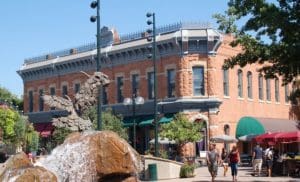
Safety Score
Fort Collins, CO

High
Exercise Normal Precaution

Getting Around

Known For
- Hippie
- College Town
- Outdoorsy
 Covid Status
Covid Status

Risk Level
High
Vaccination Progress
Daily new cases
100k
Infection rate
Positive test rate
% Vaccinated
Fort Collins is situated in the northern part of Colorado, approximately 65 miles north of Denver, the state capital. It is nestled along the Cache La Poudre River and sits at the base of the Rocky Mountain foothills.
The elevation of Fort Collins is roughly 5,003 feet (1,525 meters) above sea level.
Fort Collins is about a one-hour drive from Rocky Mountain National Park, which is approximately 65 miles to the west. The park is a major attraction for nature lovers and outdoor enthusiasts.
The primary highway to reach Fort Collins is Interstate 25 (I-25), which runs north-south along the Front Range of Colorado, connecting the city to Denver to the south and Cheyenne, Wyoming, to the north. U.S. Highway 287 also runs through the city, providing access from the north and south.
While Fort Collins does have a municipal airport, the Fort Collins-Loveland Municipal Airport, it is primarily used for general aviation. The nearest commercial airport is Denver International Airport (DIA), which is about an hour and fifteen minutes' drive to the south.
Yes, Fort Collins offers a public bus system called Transfort, which provides service throughout the city and to several nearby communities. Additionally, the MAX Bus Rapid Transit (BRT) system provides a quick and efficient north-south route through the city.
Fort Collins was founded as a military outpost of the United States Army in 1864 during the Indian Wars in the region. The fort was decommissioned in 1867, but the settlement remained and grew into a thriving agricultural community and eventually a vibrant college town with the establishment of Colorado State University.
Horsetooth Rock and Horsetooth Reservoir are popular natural landmarks west of Fort Collins. Additionally, the Cache La Poudre River, which flows through the city, is Colorado's only designated National Wild and Scenic River and is known for its dramatic canyon and outdoor recreational opportunities.
Fort Collins is in the Mountain Time Zone (MT).
Fort Collins experiences all four seasons. Summers are typically warm and dry with occasional afternoon thunderstorms, while winters can bring cold temperatures and snowfall. Spring and fall are generally mild and can vary between warm and cool weather with occasional precipitation. Tourists should check the local forecast before visiting and pack accordingly.
 Covid Status
Covid Status
![20 BEST Restaurants in Fort Collins, Colorado [2023 UPDATED]](https://www.exploreist.com/wp-content/uploads/2019/09/best-restaurants-in-fort-collins-300x168.png)